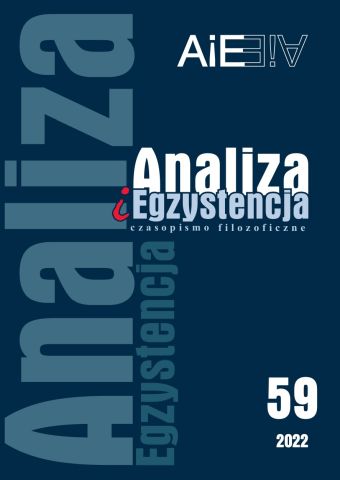
ISSN: 1734-9923
eISSN: 2300-7621
OAI
DOI: 10.18276/aie.2022.59-05





Issue archive /
59 (2022)
Człowiek dwubiegunowy. Marcuse, akrazja i psychopatologia populizmu
(The Bipolar Man. Marcuse, Akrasia and the Psychopathology of Populism)
| Authors: |
Bartosz
Kuźniarz

Uniwersytet w Białymstoku |
| Keywords: | Herbert Marcuse akrasia akratic populism cognitive capitalism reflexivity |
| Data publikacji całości: | 2022 |
| Page range: | 19 (97-115) |
Abstract
In 1964, Herbert Marcuse made a famous thesis about the one-dimensionality of late-capitalist subject. It is one of his most important theoretical concepts, as well as an extension of the thesis put forward by Marcuse in 1937 in his essay Affirmative Character of Culture. The purpose of my article is to critically revise this concept. On the one hand, it is true that cognitive capitalism has strengthened the mechanisms of controlling consumer behavior. But on the other, the postmodern society is reflexive: its production of knowledge and self-knowledge is institutionalized and systemic. The combination of these two processes leads, as I claim, to the creation of a bipolar rather than one-dimensional man and culture. Repressive desublimation today goes hand in hand with reflexivity. As a result, the postmodern subject is an acratic – a human being systematically acting against his or her will. In the second part of the text, I argue that the bipolar structure of the postmodern subject creates conditions conducive to the development of contemporary populism.
Download file
Article file
Bibliography
| 1. | Adorno, T.W. (2010). Osobowość autorytarna. Tłum. M. Pańków. Warszawa: Wydawnictwo Naukowe PWN. |
| 2. | Ainslie, G. (2015). The Cardinal Anomalies that Led to Behavioral Economics: Cognitive or Motivational? Managerial and Decision Economics, 37, 1–273. |
| 3. | Arystoteles. (2008). Etyka nikomachejska. Tłum. D. Gromska. Warszawa: Wydawnictwo Naukowe PWN. |
| 4. | Berlin, I. (1999). The Roots of Romanticism. Princeton, NJ: Princeton University Press. |
| 5. | Berman, M. (2006). Wszystko, co stałe, rozpływa się w powietrzu. Tłum. M. Szuster. Kraków: Universitas. |
| 6. | Boltanski, L., Chiapello, È. (2007). Preface to the English Edition. W: L. Boltanski, È. Chiapello, The New Spirit of Capitalism. Tłum. G. Elliott (s. ix–xxvii). London-New York: Verso. |
| 7. | Boutang, Y.M. (2011). Cognitive Capitalism. Tłum. E. Emery. Cambridge: Polity Press. |
| 8. | Dawson, M., Foster, J.B. (1996). Virtual Capitalism: The Political Economy of the Information Highway. Monthly Review, 48, 3, 40–58. |
| 9. | Duhigg, C. (2013). Siła nawyku. Dlaczego robimy to, co robimy i jak można to zmienić w życiu i biznesie. Tłum. M. Guzowska, Warszawa: PWN. |
| 10. | Fisher, M. (2020). Postcapitalist Desire. The Final Lectures. London: Repeater. |
| 11. | Fromm, E. (1984). The Working Class in Weimar Germany: A Psychological and Sociological Study. Tłum. B. Weinberger. Warwickshire: Berg Publishers. |
| 12. | Fromm, E. (1993). Ucieczka od wolności. Tłum. O. i A. Ziemilscy. Warszawa: Czytelnik. |
| 13. | Giddens, A. (2002). Nowoczesność i tożsamość. „Ja” i społeczeństwo w epoce późnej nowoczesności. Tłum. A. Szulżycka. Warszawa: Wydawnictwo Naukowe PWN. |
| 14. | Gurtowski, M. (2015). Wizja natury ludzkiej w filozofii oświecenia, neronauce i teorii socjologicznej. W: A. Zybertowicz, M. Gurtowski, K. Tamborska, M. Trawiński, J. Waszewski (red.), Samobójstwo oświecenia? Jak neuronauka i technologie pustoszą ludzki świat (s. 105–189). Kraków: Wydawnictwo Kasper. |
| 15. | Habermas, J. (2005). Filozoficzny dyskurs nowoczesności. Tłum. M. Łukasiewicz. Kraków: Universitas. |
| 16. | Hogg, M.A., Gøtzsche-Astrup, O. (2021). Self-Uncertainty and Populism. Why We Endorse Populist Ideologies, Identify With Populist Groups, and Support Populists. W: J.P. Forgas, W.D. Crano, K. Fiedler (red.), The Psychology of Populism. The Tribal Challenge to Liberal Democracy (s. 197–218). New York--Lonon: Routledge. |
| 17. | Ignatow, G. (2012). Information Capitalism. W: G. Ritzer (red.), The Blackwell Encyclopedia of Globalization. London: Blackwell. |
| 18. | Kosinski, M., Stillwell, D., Graepel, T. (2013). Private traits and attributes are predictable from digital records of human behavior. Proceedings of the National Academy of Sciences of the United States of America, 110, 15, 1036–1040. |
| 19. | Kruglanski, A.W., Molinario, E., Sensales, G. (2021). Why Populism Attracts. On the Allure of Certainty and Dignity. W: J.P. Forgas, W.D. Crano, K. Fiedler (red.), The Psychology of Populism. The Tribal Challenge to Liberal Democracy (s. 158–173). New York-Lonon: Routledge. |
| 20. | Mann, T. (2011). Poglądy człowieka antypolitycznego. Mieszczańskość. Tłum. E. Rzanna. Kronos, 2, 82–94. |
| 21. | Marcuse, H. (1969). An Essay on Liberation. Boston: Beacon Press. |
| 22. | Marcuse, H. (1968). Über den Affirmativen Charakter der Kultur. W: H. Marcuse, Kultur und Gesellschaft 1 (s. 75–137). Frankfurt: Suhrkamp. |
| 23. | Marcuse, H. (1991). Człowiek jednowymiarowy. Badania nad ideologia rozwiniętego społeczeństwa przemysłowego. Tłum. W. Gromczyński. Warszawa: Państwowe Wydawnictwo Naukowe. |
| 24. | Sloterdijk, P. (2008). Krytyka cynicznego rozumu. Tłum. P. Dehnel. Wrocław: Wydawnictwo Naukowe Dolnośląskiej Szkoły Wyższej. |
| 25. | Smil, V. (2015). Moore’s Curse. North American, Apr, 26. |
| 26. | Smil, V. (2019). Growth. From Microorganisms to Megacities. Cambridge: MIT Press. |
| 27. | Taibbi, M. (2022). Marcuse-Anon: Cult of the Pseudo-Intellectual. Pobrano z: https://taibbi.substack.com/p/marcuse-anon-cult-of-the-pseudo-intellectual-1d3?utm_source=url (22.02.2022). |
| 28. | Urbinati, N. (2019). Me the People. How Populism Transforms Democracy. Cambridge, MA: Harvard University Press. |
| 29. | Walsh, M. (2020). Algorytmiczny lider. Jak być inteligentnym, gdy maszyny są inteligentniejsze od nas. Tłum. M. Romanek. Poznań: Wydawnictwo Poznańskie. |
| 30. | Watson, M. (2022). The Memeing of Mark Fisher. How the Frankfurt School Foresaw Capitalist Realism and What To Do About It. Winchester: Zero Books. |
| 31. | Zuboff, S. (2020). Wiek kapitalizmu inwigilacji. Walka o przyszłość ludzkości na nowej granicy władzy. Tłum. A. Unterschuetz. Poznań: Wydawnictwo Zysk i S-ka. |